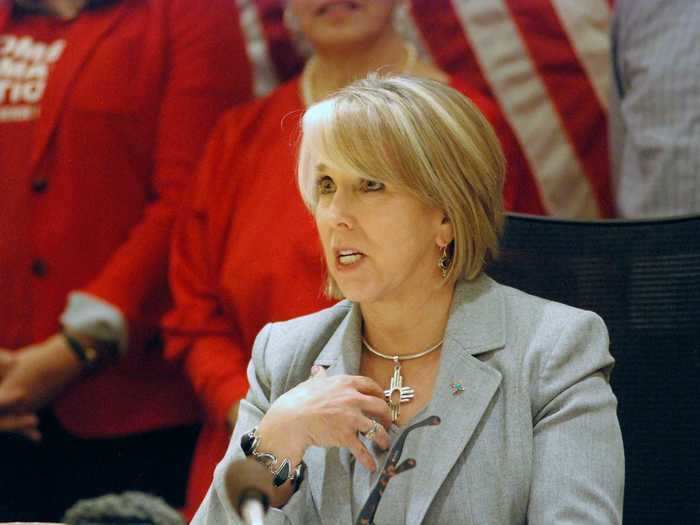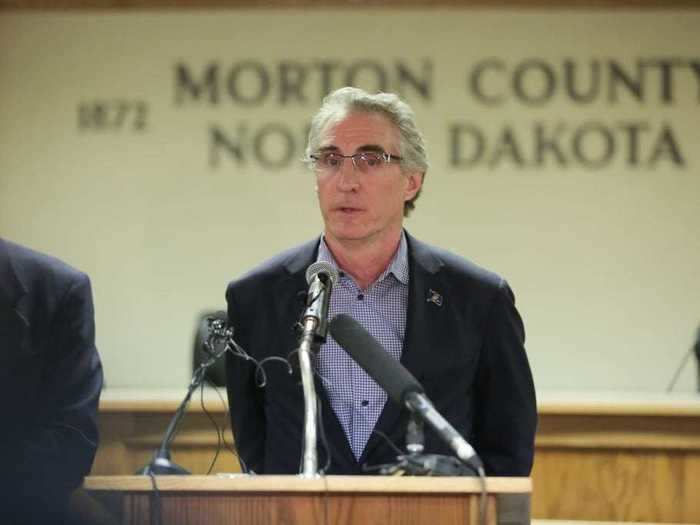A traveler walks past screeners testing a system of thermal imaging cameras which check body temperatures at Los Angeles International Airport (LAX) amid the COVID-19 pandemic on June 24, 2020 in Los Angeles, California.Mario Tama/Getty Images - Several states are tightening restrictions in an attempt to curtail the spread of the coronavirus as millions of Americans are expected to travel and gather for Thanksgiving.
- These measures come as the number of positive coronavirus cases surge across the country.
- Public-health experts like Dr. Anthony Fauci have said indoor gatherings like the ones that occur during Thanksgiving are likely to easily spread the coronavirus.
As the US faces another surge in the number of positive coronavirus cases, several states are tightening restrictions in an attempt to curtail the spread.
The restrictions come just ahead of the Thanksgiving holiday season when millions of Americans typically travel and gather with their extended family members and friends.
Dr. Anthony Fauci, the nation's top infectious disease specialist, said late last month these gatherings are likely to easily spread the coronavirus.
"If you have people like elderly or individuals who are compromised because of underlying conditions, you want to take a couple of steps back and say, is it worth it for this year to bring those people together when you don't know what the status of everybody in that pod that you've created is?" Fauci said in conversation with peer-reviewed journal JAMA.
Guidelines from the Centers for Disease Control and Prevention encourage people to modify their holiday plans to limit the spread of the coronavirus. The agency has stressed these recommendations are meant to supplement local and state restrictions.
Here are the states that have enacted tighter restrictions in response to surging cases that can affect holiday plans.
Alaska
Alaska Gov. Mike Dunleavy.
AP Photo/Mark Thiessen
Gov. Mike Dunleavy urged Alaskans to practice social distancing and wear masks ahead of the upcoming holiday.
The state has been reporting high infection rates, particularly among its first responders and front-line workers.
"For the next three weeks, I am asking you as the governor of Alaska, that we do everything possible to reduce these cases and bend this trend downward," he said in a video to Alaskans, according to the Anchorage Daily News.
California
California Gov. Gavin Newsom.
AP Photo/Rich Pedroncelli
California Gov. Gavin Newsom issued on November 13 a travel advisory and urged people to avoid non-essential out-of-state travel.
"California just surpassed a sobering threshold — one million COVID-19 cases — with no signs of the virus slowing down," Newsom said in a statement announcing the restriction. "Increased cases are adding pressure on our hospital systems and threatening the lives of seniors, essential workers, and vulnerable Californians. Travel increases the risk of spreading COVID-19, and we must all collectively increase our efforts at this time to keep the virus at bay and save lives."
The advisory also asks those who do travel to quarantine for two weeks upon their return.
Coronavirus cases have been rapidly spiking in California, with hospitalizations increasing at a rate of 30% in recent weeks.
Colorado
Colorado Gov. Jared Polis.
Helen H. Richardson/MediaNews Group/The Denver Post via Getty Images
Colorado Gov. Jared Polis asked residents to limit social interactions beyond their households and continue to wear masks for the next few weeks.
"As hospitalizations increase everyone needs to do better by socializing only with those who you live with, wearing a mask and staying 6 feet apart, so we can get our numbers under control," Polis said in a statement.
Illinois
Illinois Gov. Jay Pritzker.
REUTERS/Kamil Krzaczynski
Illinois Gov. Jay Pritzker urged people to quarantine ahead of the Thanksgiving holiday if they plan to hold a gathering.
"If you're choosing to travel, it is even more important that you take extra caution in the coming weeks," he said on November 12. "If you do choose to have a small in-person Thanksgiving, have every single person more or less quarantine for two weeks prior, which would be today."
The state saw record highs in early November in the number of confirmed coronavirus cases and hospitalizations.
New York
New York Gov. Andrew Cuomo.
Scott Heins/Getty Images
New York Gov. Andrew Cuomo earlier this week enacted several measures to limit the spread of the coronavirus in the state.
Cuomo said on November 11 that there can no longer be indoor gatherings in private residences with more than 10 people. He also said businesses holding a liquor license and gyms must close by 10 p.m.
"COVID is getting worse by the day," Cuomo tweeted. "All around the country. The fall surge is here. We are taking action but we need New Yorkers to do their part. Wear a mask. Get tested. Follow all health guidelines. Take this seriously."
New Mexico
New Mexico Gov. Michelle Lujan Grisham.
AP Photo/Morgan Lee
New Mexico Gov. Michelle Lujan Grisham said on November 13 that there will be a statewide lockdown in response to surging coronavirus cases.
"New Mexico is at the breaking point," she said in a tweet. "We face a life-or-death situation, & we must & will act to preserve the lives of New Mexicans."
Beginning November 16, residents are instructed to shelter in place and essential businesses can run only at limited capacity.
"We've had every opportunity to preempt this by taking precautions to slow the spread," she tweeted. "But cases and deaths have continued to rise and hospitalizations are at record highs. These steps are difficult but necessary to blunt the spike of serious COVID-19 infections statewide."
North Dakota
North Dakota Governor Doug Burgum.
Stephen Yang/Getty Images
North Dakota Gov. Doug Burgum enacted on November 13 a statewide mask mandate and urged residents to limit gatherings ahead of the holidays.
Burgum said masks are required anywhere indoors, as well as outdoors where social distancing is not an option. Bars and restaurants are also limited to working at 50% capacity.
"We believe in North Dakotans," Burgum said. "We believe in the power of individual responsibility. And we need individual responsibility now more than ever to slow the spread of COVID-19."
Oregon
Gov. Kate Brown of Oregon.
Andrew Selsky/AP
Oregon Gov. Kate Brown, along with officials in California and Washington, announced a travel advisory to limit the spread of the disease.
The travel advisory discourages out-of-state travel and asks those who do the leave to quarantine for 14 days when they come back.
"If you do not need to travel, you shouldn't," Brown said in a statement. "This will be hard, especially with Thanksgiving around the corner. But the best way to keep your family safe is to stay close to home."
Brown on November 13 announced a "two-week freeze" until December 2, shuttering several indoor facilities and businesses and limiting restaurant service to takeout only.
Vermont
Vermont Gov. Phil Scott.
AP Photo/Wilson Ring
Vermont Gov. Phil Scott said on November 10 that visitors to the state will be required to quarantine and cautioned residents against unnecessary travel.
"If it's just a want, let's hold off on that for a while," Scott said during a press conference.
Individuals who choose to travel to Vermont will have to either quarantine for 14 days or quarantine for seven days and produce negative coronavirus test results.
Washington
Washington Gov. Jay Inslee.
AP Photo/Rachel La Corte
Washington Gov. Jay Inslee, along with the governors of California and Oregon, issued a joint travel advisory in an attempt to drive down cases of the coronavirus in the states.
There have been spikes in the number of confirmed cases in the state for weeks.
"COVID cases have doubled in Washington over the past two weeks. This puts our state in as dangerous a position today as we were in March," Inslee said on November 13. "Limiting and reducing travel is one way to reduce the further spread of the disease. I am happy to partner with California and Oregon in this effort to help protect lives up and down the West Coast."
On November 12, Inslee also encouraged people to avoid gathering in large groups.
"We have to rethink these holidays," he said.










